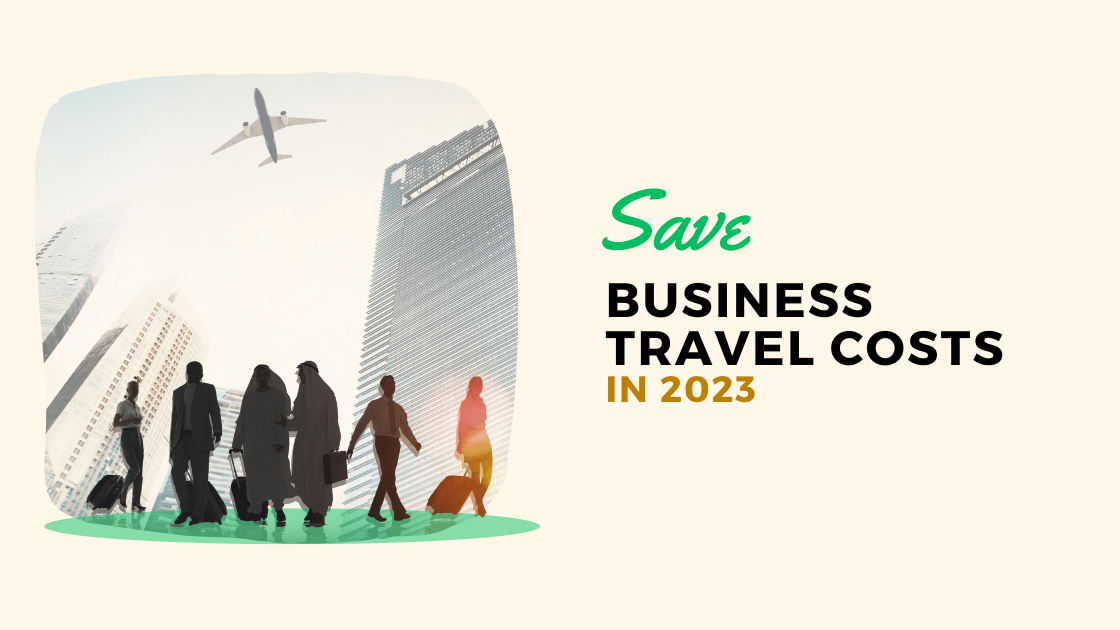The business world in 2023 is more interconnected than ever, with teams often spread across multiple locations or even countries. As a result, businesses face new challenges, one of which is controlling the rising cost of business travel. Do you want to know “How to Save Business Travel Costs in 2023?”.
The Major 3 Problems
#1 Using B2C Consumer Apps for Business Travel
Travel managers of many companies today are making the mistake of using business-to-consumer (B2C) travel apps for business purposes. These apps not only cost more, but they also struggle to deal with the complexities of business travel.
#2 Using Reimbursement Model in Business Travel
The reimbursement model is another persistent difficulty that is a pain for both employees and managers. In this setup, workers are less likely to put the company’s finances first, which can lead to higher travel expenses.
#3 Lack of one-stop Travel Management Solution.
The cost-related problem becomes more complex when you consider that there is no free, all-in-one travel management platform designed with business travellers in mind.
But don’t worry! In this article, you will learn about nine smart ways to cut costs. We’ll also discuss how a travel manager like you can make the most of your time in 2023.
The 9 Smart Strategies to save Business Travel Costs
- Layer of Approvals with the Online Approval System
- Optimising the cost using the L1 option
- Leveraging business travel analytics
- Implementing technology solutions
- Implement a 7-Day Booking Policy
- Corporate Fares and Negotiations
- Opt for alternative accommodations.
- Regular Policy Audits
- GST Benefits
#1 Layer of Approvals with the Online Approval System
Controlling expenses effectively requires a systematic approval system. Without it, uncontrolled bookings can skyrocket travel expenses.
Let’s take the case of an employee planning to travel first class for a domestic one-hour flight. To make sure that money isn’t wasted, an approval system would mandate that a higher-level authority approve this expenditure.
If you compare an online approval system to email-based ones, the former is exponentially faster. Also, the online approval system is more transparent and keeps a clear record of all approvals and reasons provided, thus making the process seamless.
#2 Optimising the Cost Using the L1 Option
There is an abundance of hotels available online, leaving many travel managers feeling overwhelmed. If you are one of them, you can rely on business-to-business travel agencies to manage the employees’ travel.
Such agencies will play an important role because, they’ll use their extensive networks of vendors and high negotiation power to get the lowest price without sacrificing quality.
The least expensive option is generally known as the L1 option. Integrating this with the online approval system can streamline the complete hotel booking process.
Imagine if an employee selects the L1 option provided by a business travel management company like TaxiVaxi; it can automatically be approved, eliminating the need for multiple layers of authorization.
Let’s compare this with the reimbursement model, where employees are given a set limit for their business travels. In almost every case, employees use the complete limit without considering cost-effective options and without any layers of authorization or approval.
#3 Leveraging business travel analytics
You would agree that informed decisions are better than guessed ones. And understanding your company’s travel patterns can help you make data-driven decisions. Such decisions can save business travel costs significantly.
For instance, if the sales department frequently travels, streamlining their approval process by minimising the steps involved can save business travel costs as well as time.
Similarly, recognising patterns in destination choices, such as frequent visits to regional branches, can be used to negotiate better rates with service providers.
TaxiVaxi even goes the extra mile to help you make the best decisions possible by providing semi-annual and annual personalised analytics reports.
#4 Implementing technology solutions
Modern problems require modern solutions. Utilising a state-of-the-art travel management system can transform how you manage business travel.
Such platforms often come with online approval mechanisms, real-time booking details, and streamlined expense management features.
Furthermore, top executives can use adaptive MIS tools to get a bird’s-eye view of all travel bookings, ensuring transparency and control.
What if these all-package platforms come with zero subscription costs? TaxiVaxi is a bill-to-company invoice-based mechanism with no upfront cost and no credit-based booking mechanism.
#5 Implement a 7-Day Booking Policy
There’s a lot of wisdom in the saying, “A stitch in time saves nine.” By ensuring that all bookings are made at least seven days in advance, companies can capitalise on early-bird rates, saving considerably.
This approach also gives ample time for changes or cancellations if plans change. Policy mapping—customising the platform to match your company’s travel policy—is another layer that can drive costs down. And with TaxiVaxi’s hybrid approach, combining both online and offline elements, they always keep your company’s travel policy at the forefront.
#6 Corporate Fares and Negotiation
When it comes to travel costs, volume often equates to discounts. Companies with high booking volumes can secure corporate fares and special discounted rates from airlines and hotel chains.
But what about smaller companies with fewer booking frequencies? That’s where agencies like TaxiVaxi step in, sharing the benefits of their large-volume bookings and negotiation power, with their clients.
You can still get corporate fares with no cancellation fees if you are the travel manager for a company with a low booking volume and low booking frequency.
#7 Opt for alternative accommodations.
When booking lodgings for a large group of employees, you naturally turn to established hotel chains. What if, however, they are not available in your destination city? Or are there not a variety of alternatives, including some that are inexpensive?
While hotel chains are the traditional choice, they might not always be the most cost-effective or available option.
TaxiVaxi, with its wide network, ensures that you always have a quality place to stay, be it a 3-star or a 5-star hotel, wherever you’re travelling within India.
#8 Regular Policy Audits
Policies regarding travel should not be written in stone. Constant reviews guarantee they are still useful and up-to-date with the latest travel trends and obstacles.
Maybe one year ago, the travel policy was perfect in your eyes, but it might be outdated or suboptimal now. Therefore, regularly audit your corporate travel policies and employee travel policies.
The two main reasons to evolve your policies are:
- Benchmarking: Comparing your policies with industry standards or with peers can be a great way to identify areas for improvement.
- Technology Evolution: As technological solutions evolve, it’s crucial to ensure that the travel policy evolves with them. Maybe there is a new approval mechanism that’s being implemented or new mandates while travelling for businesses and employees.
#9 GST Benefits and Save More
Tax benefits can lead to significant savings. How can you save business travel costs with such benefits?
- Maximising ITC: One of the significant advantages of GST for businesses is the ability to claim ITC on goods and services purchased for business use. In the context of travel, if the bookings are done under the company’s name and GST details, the company can claim ITC on the GST paid, thus reducing the effective travel cost.
- Reimbursement Models vs. Direct Booking: In a reimbursement model, if employees book travel expenses under their name and later claim reimbursement, the company loses out on the GST credit. However, with direct bookings using a company’s GSTIN, this credit is retained. This makes direct bookings financially more beneficial in the GST regime.
- Streamlining GST Compliance: Using platforms or services that are GST-compliant ensures that all invoices and receipts are in the required format, making GST filing and audits smoother. This not only saves potential penalties and interest but also administrative hassle.
Conclusion
In 2023, business trips can be both time-consuming and costly. As the company’s travel manager, you’re responsible for making sure business trips go off without a hitch while staying within budget. It’s possible to save money by avoiding common blunders like downloading the wrong travel app or making the payment process too complicated.
Using the right resources and strategies can greatly improve and reduce the cost of business travel. Remember, saving money on travel can be like earning extra money for your company.
You need a simple method to organise your business trips. Get in touch with TaxiVaxi now! Need more information? Contact us through this link and have a conversation with us. Our goal is to make your vacation hassle-free and inexpensive.




